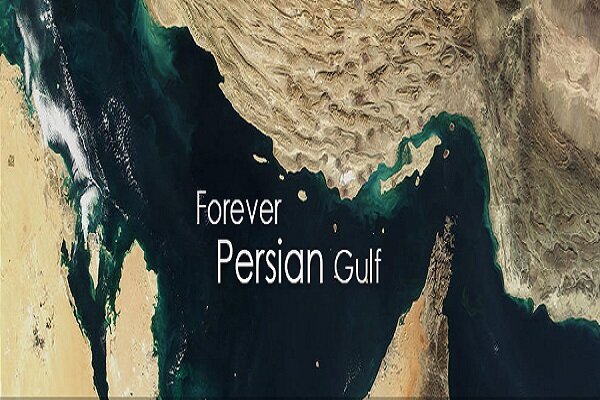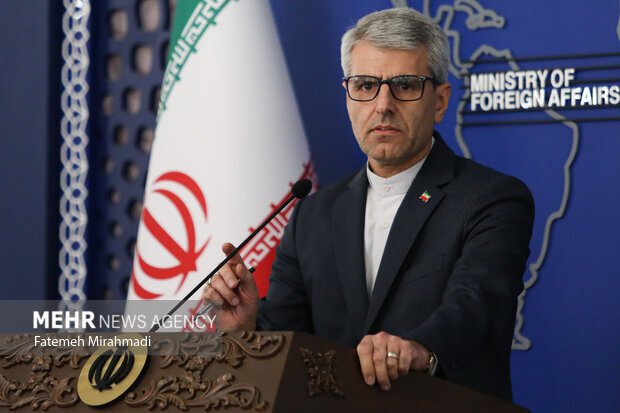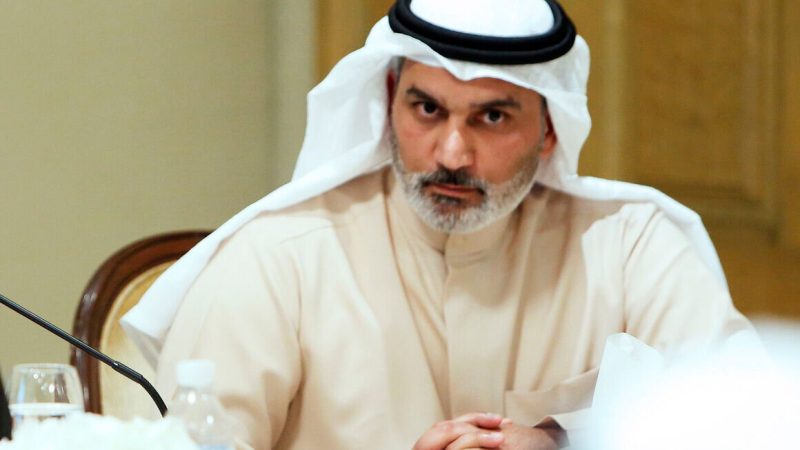Enrichment on Iran’s soil, meaningful sanction removal ‘red lines’ in talks with US: Spox

Iran has reiterated that its right to enrich uranium domestically and the effective removal of the United States’ illegal and unilateral sanctions remained non-negotiable demands during the indirect talks with Washington.
Speaking at a weekly press conference on Monday, Foreign Ministry spokesperson Esmaeil Baghaei underlined that the Islamic Republic’s “red lines,” including domestic uranium enrichment and meaningful sanction relief, were central to Tehran’s negotiating position and would be pursued with utmost seriousness.
“Entering into the details of any talks must occur within a framework already agreed upon by both sides,” he stressed, adding that no agreement on specific issues would be finalized unless the country’s overarching principles were honored.
The two sides have held three round of Oman-mediated talks in as many weeks.
Iranian officials have insisted that domestic enrichment activities were a sovereign right and not subject to compromise.
The position was most recently underlined by Deputy Foreign Minister for Political Affairs, Majid Takht-Ravanchi, who reaffirmed before Majlis (the Parliament) that zero enrichment, Iran’s defense capabilities, and its regional influence were “non-negotiable.”
Baghaei also commented on a proposal made during a recent article by Foreign Minister Abbas Araghchi about potential cooperation between Iran and the United States towards construction of nuclear reactors.
“We have never had [either issued or faced] any prohibition on other countries’ contributing to this issue,” the spokesman said.
Commenting on recent expert-level meetings between Iranian and American officials, Baghaei said Iranian delegations included economic specialists and senior experts familiar with the protocols of the International Atomic Energy Agency (IAEA) — the United Nations nuclear watchdog.
This approach, he noted, would continue in future rounds.
The official emphasized that effective termination of sanctions had to involve clearly defined obligations on the part of the other side and guarantee Iran’s unrestricted access to its financial resources abroad. “Unfreezing Iran’s assets is a legitimate right of our nation and an integral part of the talks,” he noted.
Europe’s potential role in diplomacy
Addressing Europe’s likely contribution to the diplomatic process, the spokesperson said Iran attached significant importance to both neighboring countries and the European parties to the Joint Comprehensive Plan of Action (JCPOA), a 2015 nuclear agreement between the Islamic Republic and others.
“In clarifying the nuclear issue and facilitating a constructive environment, we hope that Europe will act responsibly and in good faith,” he stated.
The United States left the JCPOA in 2018. Its European allies in the deal — the UK, France, and Germany — said at the time that they would convince Washington to return to the accord.
The trio, however, not only failed to do so, but also followed in Washington’s footsteps by returning the sanctions that the JCPOA had lifted and piling up even more coercive economic measures against Tehran.
Commenting on an underway visit by an IAEA technical delegation to Iran, Baghaei described the trip as continuation of earlier talks between the agency’s Director-General Rafel Grossi and Iranian authorities.
“The visit is strictly technical, focusing on resolving outstanding safeguards-related issues,” he explained, adding that the team would be meeting officials from the Atomic Energy Organization of Iran (AEOI) later in the day.
Warning to adversaries
Reacting to hostile rhetoric from the Islamic Republic’s adversaries, including the Israeli regime, the spokesman said such remarks were neither unexpected nor new.
“Any adventurism against Iran will be met with a crushing response,” he warned.
“Western countries that continue to support this illegitimate regime must reconsider their actions, as they are complicit in perpetuating instability.”
Diplomacy with India, Pakistan
Regarding recent tensions between India and Pakistan that followed a deadly terror attack in Indian-administered Kashmir, the spokesperson conveyed Iran’s sympathy to the victims and condemned all forms of terrorism.
He reiterated Tehran’s neutral and friendly approach toward both the nations.
“India and Pakistan are both dear friends to us, with deep historical ties,” Baghaei said, emphasizing that the Islamic Republic welcomed peaceful management of regional tensions and had offered to assist if necessary.
The official, meanwhile, confirmed that President Masoud Pezeshkian would soon travel to China to participate in an upcoming Shanghai Cooperation Organization (SCO) meeting, scheduled for the coming weeks.
He also responded negatively to a question whether Iran might seek to reopen its embassy in the Syrian capital Damascus.






